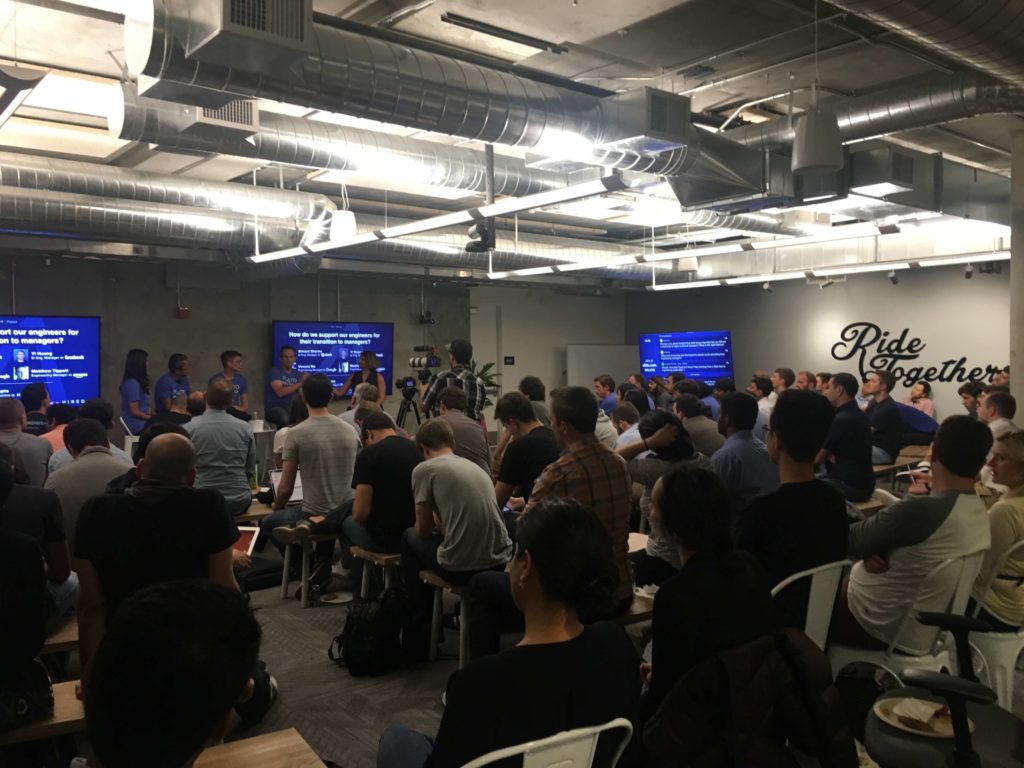
Top Tech Leaders Get Real About Engineering Management
This week, our friends over at Plato hosted a magnificent event highlighting a cavalcade of engineering heroes. Engineering leadership from Google, Facebook, Amazon, Lyft, and Box were on hand to discuss how they’ve scaled their teams, adapted to new technologies, and supported teams in their aspirations to grow as technical contributors and engineering managers.
Hired’s very own SVP of Engineering, Nidhi Gupta, sat alongside a panel of these leaders and in turn led them in a discussion surrounding what to look for when earmarking team members for more senior positions. When it came to assessing motivations and preparing team members for a new role in engineering management, the panelists pulled no punches. We, however, did pull out some of our favorite punches from the panelists below, so you can join in the fun even if you weren’t able to live tweet the event with your phone in one hand and free pizza in the other. Drumroll please.
Much of the panel surrounded the issue of helping people identify which career track is for them. Matthew Tippett, Engineering Manager at Amazon, suggested beginning the process by having people explain in their own words the difference between the career paths.
“Start by asking people what organizational leadership vs. technical leadership means to them. As they talk about it, you begin to see their eyes open. When you’re a technical leader, you’re helping a technology grow and expand and increase capability. As a manager, you’re doing the same team but for the team. Rather than software architecture, it’s people architecture.”
In a similar vein, Senior Engineering Manager at Slack Shivani Sharma suggested digging in to an individual’s motivation to determine what a good fit is.
“Do they think it’s a promotion? That’s the wrong motivation. We have two engineers who are naturally gelling the team, adding to the culture, mentoring people on the team, and in those cases management is a great fit. But in every case, it’s important for them to understand it’s not a promotion, it’s a lateral, separate track.”
At this point, Vincent Mo, an engineering manager at Google, chimed in with the question that helped him decide where he enjoyed spending his time.
“Someone asked me if I preferred debugging code, or debugging people. And I thought, when debugging code, I spend all night digging through the code and solving the bug. But the satisfaction of fixing it didn’t last as long as when someone would come to me about disagreements with a teammate, or another team, and we would work it out together. When someone comes to me distressed and they go away with clarity, that gave me a whole different level of satisfaction.”

Yi Huang, a Senior Engineering Manager at Facebook, issued a foreboding take on the beginning of an engineering management career.
“Before someone becomes an EM, make sure they know this is a sacrifice. You are about to use the skills you aren’t good at to meet expectations, and you are going to completely discard the skills that got you to where you are. The first few months are going to miserable. You need to be prepared that it’s going to be super hard for you.”
At this, Hired’s fearless engineering leader Nidhi recalled her own challenge in transitioning.
“The hardest part about the transition to engineering management was unlearning everything. You get to a certain point from a technical skillset standpoint before you transition into management, where you’re used to walking into a room, drawing something on the board and saying ‘Hey, this is how this should be.’ But as a manager you have to completely unlearn that and bite your tongue in some of those situations.”
Remember Matthew Tippett from Amazon? He empathized with Nidhi, and shared his own early struggle:
“For me, it was sitting down for a one on one and having the first ‘you’re struggling in an area’ conversation. Engineers don’t normally give that sort of feedback. Being skilled about objectivity and giving constructive criticism is something that only comes with practice. That’s the hardest first lesson. In the first 90 days, that issue of ‘how do I have those hard conversations?’ is probably the scariest thing for a new engineering manager, but it’s something you get better at with practice and input from other leaders in the organization.”
Want to hear more from these engineering leaders? Head on over to Plato and enjoy 1:1 mentorship with senior engineering leaders, as well as detailed documentation surrounding how to deal with the most common and complex engineering management challenges.
Related blog posts

Is My Job Too Much Work for One Person?
4 Strategies to Address Feeling Overwhelmed at Work Whether you work for a startup or...

Are You Burnt Out (Or Do You Really Just Hate Your Job)?
The difference between the two and what to do about it Your career may be a large part of your...

4 Things Every Engineer Must Do Before A Technical Interview
In order to become an expert on something, mere talent or aptitude is not enough. According to...

Where Do Engineer Salaries Pay the Best (Highest) Standard of Living?
Opportunity shifts from higher cost-of-living markets The rise in remote work prompted...

What Makes You Love Your Job? 6 Crucial Job Happiness Indicators
In a world with increasingly long workweeks and demanding workplace expectations, there’s a...

Salary Negotiation 101: How to Know and Ask For Your Salary Worth
Salary negotiation is a difficult task for everyone. That goes for whether you’re just...


